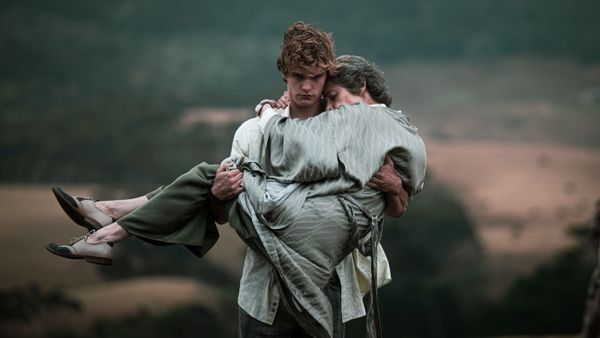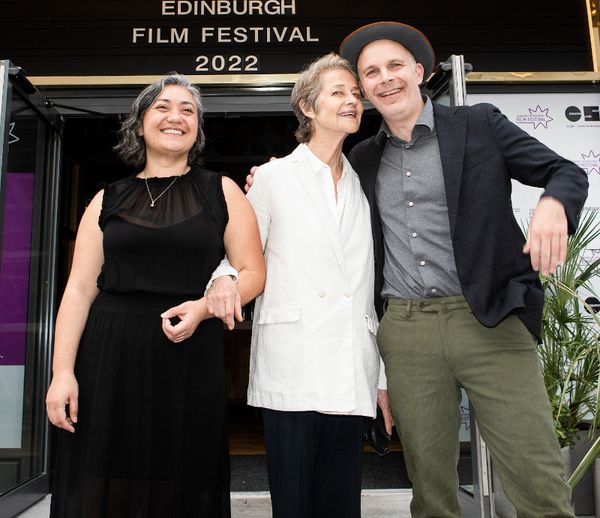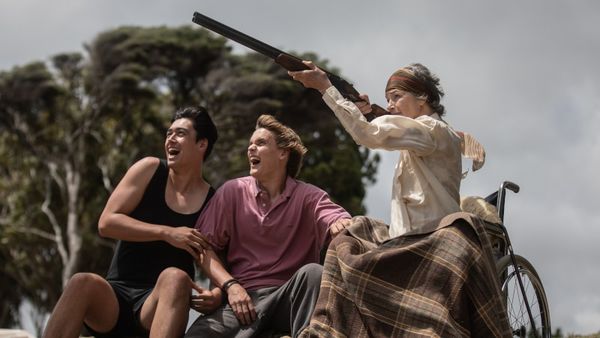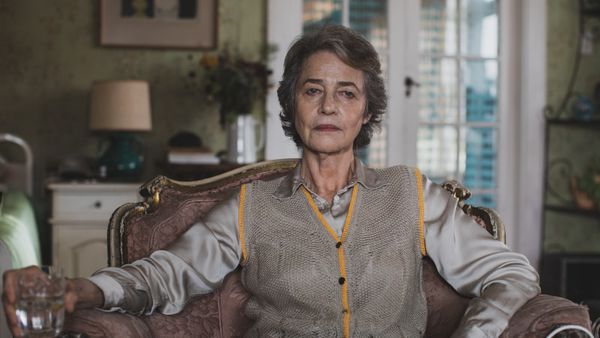AW: This seems to be a very personal project for you, compared to other things you've done and I wondered how that affects you, when you're directing something that is so intensely personal like this?
Matthew J Saville: Well, obviously, I care a lot about anything I do, but because the story comes from my grandmother moving in with us - it's not her character, she's not Ruth - but there is a kind of a sense trying to make it work. And, I suppose I was, as a result of that, worried about my family and things. But part of the process has been like, not distancing myself from it but turning it into something else. It comes from, you know, meeting this woman when I was in my last year at school, but didn't really know, and who enjoyed a gin, was very smart and had an electronic bell. But then, it's become something else. And that's part of the process. And that goes all the way through to when you're filming. That's the different world, and then you just try to honour what that is. But the most important thing is, I suppose, is managing sort of, a transformative experience for an audience over that time and designing that.
AW: Even though the characters are fictionalised, the come from a real place, and I was wondering how your dad and family did react to that?
MS: They knew I was always doing it. And there's a little moment of backstory - a story about throwing the knife or something. That's kind of something that happened to my dad when he was a kid. So there are moments but it's about families that mend. Certainly with my family. And I think everyone has that sort of story where things are just a bit distant, don't quite work or we disconnect. But then we're kind of there for each other in the end. There was no fear from them, they didn't feel judged.
AW: I have to ask you about casting Charlotte Rampling. I gather she wasn't too keen to come to New Zealand for the shoot?
MS: Well, she has a Kiwi connection. We managed to get to read the script and she really liked it. And she kind of said, "New Zealand's a long way away". So it was kind of about going over and convincing her that if she did jump on a 30-hour flight, or with maybe a stopover or whatever it would be not just a good film, but also a good experience for her to be involved with. And I think she really loved it. We had a really cool set, with some of the old school New Zealand filmmakers, it's a really cool community. Everyone's friendly and I know she loved that.
 |
| Sam (George Ferrier) and Ruth (Charlotte Rampling) in Juniper. Matthew J Saville on casting the pair of them: 'They just had chemistry' Photo: Jen Raoult |
MS: It was strange. the film industry in New Zealand when Covid hit had a boom, because we were Covid-free and everything was just going crazy. What happened was as we were shooting, this strange flu thing was coming and we were like, "Ah, that's not a thing. Who cares about that thing?" And then I got in the edit suite and I was joking with the editor, "Hey, do you think we'll go into lockdown?" And then two hours later, I was packing the edit suite up, putting it in the car, driving past the service station, grabbing some chips, some milk and putting it in my home. We didn't have any pick-ups, so what we had was what we had, we had five weeks of a shoot.
AW: How was working with Charlotte and George because she comes with a massive CV and then you've got a youngster - does that help with the onscreen relationship?
MS: It was about building a connection with him. So because the film set in the Nineties, we got George to write Charlotte a handwritten letter to start it all off. He wrote this letter and posted it and then six weeks later, he gets a letter back from her. In his letter, he sort of said, "I'm really looking forward to working with you. I'm nervous, but it's you know.." and, and she wrote back to him. She's really generous and all the older cast members really nurtured him. But George is strong, and he's confident and, you know, it kind of worked. They just had chemistry.
AW: And how was it for you to work with them as it was your first feature. Were there any nerves on your part or were you just happy to have everybody there?
MS: Well, sometimes there's no time for nerves. It's like the pressure of shooting something in five weeks. You're nervous, but you've got to wake up at five in the morning, I tried to get to set really early and walk around all the places. Charlotte and I had met. Part of getting her was to meet with her and talk about the script. And we kind of connected. So obviously, there's this icon, and then there's the person. It just felt like a connection that was going to work. Of course I was really nervous. When she came out of the plane in New Zealand, we were all like, "Oh, she's actually here." But there was just a natural chemistry between George and Charlotte.
AW: When you were shooting a film that's personal on some level does it affect you emotionally a bit, when you come to certain scenes?
MS: Ruth is very different from my own grandmother. She's a mixture of herself and all these wonderful war journalists. But when it comes to the characters, I want every character to be honoured. And as a human, so they're not a kind of a caricature or something like that. I suppose with the end of the film, and all sorts of things, it's about capturing something that was a similar, slightly similar experience but its own thing. The inciting incident happened in my family's life, and that sits with this woman who broke her leg and came, but then the rest of it is kind of all made up, based on being truthful to the story I wanted to tell.
AW: Some of the observations your film makes about boarding schools makes it seem as though they were pretty tough environments back then.
MS: Yes, totally. I was sent to boarding school like that really because I was a naughty, naughty kid. And my parents were like, "This guy needs a bit of a kick in the butt". So my mum worked night duties so they could send me to a school where I could get disciplined, I suppose. And it was kind of like a school for kids whose parents split up or farming kids, that kind of a thing. But my dad has a history, you know, he went to boarding school from the age of five. So those are real things. He talks about it with a "fiction", but it does sort of feel occasionally like someone who talks about going to the Second World War, and they couldn't talk about it in the beginning. But then afterwards, they sort of reminisce about it, "It's actually pretty rough, dude". I've got two boys and the idea of sending them to boarding school at the age of five. I can't imagine it. I went in the last couple of years of high school. I was a day pupil.
 |
| Juniper producer Desray Armstrong, Charlotte Rampling and Matthew J Saville Photo: Pako Mera/Courtesy of EIFF |
MS: It kind of, like, finding that kernel that I held through the film. And it does tie in to the fact that in a weird way, it's a love story in between these two characters, or platonic love story. I did go to a school with quite a high rate of suicide, and things like that. So it was something that I wanted to deal with in a hopeful way.
MS: The film is full of beautiful landscapes, how was working with cinematographer Martyn Williams on that?
MS: We made a film together called Hitch Hike, which you can watch online if you'd like [You can find the short here] And that was just like a nice experience and we sort of gelled together. This was his first feature as well. I had really experienced heads of department but it was also important to me to have some mates around and he's great - a really strong DoP, who can think on his feet.
AW: There's a lot of depth in the craft in New Zealand because of so many things getting shot there.
MS: It's a Catch 22. What happens is because a lot of big projects get shot over there, [the experts] are all on those projects, so you've got to kind of lure them away. They want to do it because they want to be in a Kiwi film but they have to take a pay cut. We were lucky that there was a show, I won't say what it was, but it kind of fell over. And a bunch of really awesome people were on it. And then we're like, "Okay, well, why don't you just come to us?"
 |
| Matthew J Saville: 'Ruth is very different from my own grandmother. She's a mixture of herself and all these wonderful war journalists' Photo: Jen Raoult |
MS: Yes, I occasionally do some acting for a bit of pocket money but it's not really a huge interest for me. If I got offered something cool, I would probably wouldn't say no but I'm a filmmaker and I just want to tell stories. I'm gonna I'm doing a bit of a hustle at the moment. I've got a new film. The script isn't quite ready, but I'm really excited about that. And a new couple of TV things that I want to do.
AW: So the idea of film and television appeals, because TV is generally more long form.
MS: It really depends. Short films are great because they are so pure, cinema is great because it's such a condensed chance to take people on a journey. But with television, there's a chance to explore characters and go to other places but the rules are kind of the same. I've had really powerful experiences with television and with cinema, so it's kind of whatever suits the narrative.
Juniper will be released in the UK on September 23






















